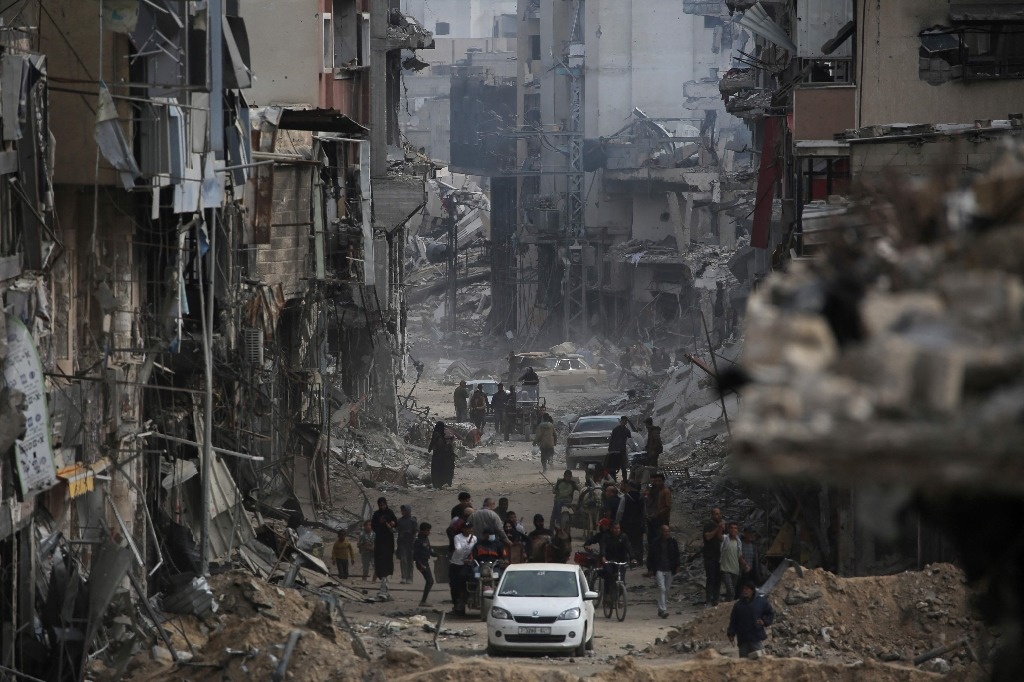Tel Aviv. Lhe palestinians are slowly returning to the devastated city of khan yunis in southern gaza to find their homes completely destroyed, with piles of rubble piled above craters opened by bombs.
Picking their way through twisted iron and collapsed buildings, it seems extraordinary that anyone has returned, but they fear what the Israeli army has planned for next.
Many of those heading home, after months of intense shelling and street battles, come from the city of Rafah, on the southern tip of Gaza. Israeli officials indicate that the withdrawal of troops from Khan Younis is part of a regrouping in preparation for the Rafah offensive, where more than a million Palestinians are believed to be taking refuge.
Khalil Haddad, his wife and three children, although nothing remains of their home in Khan Younis, feel immense relief not to be in Rafah, under the threat of an Israeli onslaught.
“People are terrified of what may happen in Rafah. The main thing is that the family stays alive. Khan Younis has been destroyed, but at least there will be no fight. We’ll find somewhere to stay and then I’ll bring my father and mother. I won’t be able to rest until I do it,” said the 48-year-old carpenter.
“We can’t stay in our house. We have relatives living here, maybe they have somewhere we can stay for the moment. I don’t know what will happen in the future. It’s been terrible in the past six months, since the war started. But we were afraid that some of us would die if we stayed in Rafah.”
In a video message, as people return to Khan Yunis, Israeli Prime Minister Benjamin Netanyahu raised the tone of his warning to invade Rafah, declaring: “There is a date.” He stated that the operation in Rafah is essential for victory. “It will happen,” he announced, without elaborating. Later, the US State Department reported that it had not received information on a date for the assault on Rafah.
Jamila El Masry commented that Khan Yunis is unrecognizable from when she and her family escaped to Rafah on instructions from the Israeli military. “We knew they had bombed for months. But we didn’t expect this. They didn’t leave anything. It will have to be rebuilt, but who will do it?”
While this is happening, calls for a ceasefire in Gaza are growing, as the number of Palestinian deaths passes 33,000, according to health officials in the strip, governed by Hamas. Several nations, including Britain and the United States, Israel’s staunchest ally, have demanded that Netanyahu’s government allow more aid into Gaza.
Months of aerial bombardment, a ground invasion and a blockade, triggered by the Hamas attack on southern Israel on October 7, have left areas of northern Gaza on the brink of famine. Some 1,200 Israelis perished in that raid and another 250 were taken hostage.
The United States has also raised the tone of its calls for a ceasefire in recent weeks. This Monday, the White House reported that CIA Director William Burns was in Cairo to participate in a “serious round” of negotiations for a ceasefire and the release of the hostages who remain in Gaza, whose number is estimated at 130, although Israel believes a quarter of that number are dead. White House spokesman John Kirby said Washington takes the discussions very seriously and that an agreement to free the hostages would include a truce of about six weeks.
Although Hamas rejected the latest Israeli proposal, suggested in talks in Cairo on Monday night, the Qatari mediator indicated that there is cautious optimism about the negotiations and that a new proposal has the potential to close disagreements between Israel and Hamas. The spokesman for the Qatari foreign ministry, Majed Mohammed al-Ansari, told the BBC: “If you ask me if I am more optimistic today than I was two days ago, I would say yes, I am.”
However, he warned: “We are by no means in the final stretch of the talks.”
Two Egyptian security sources and the state television channel Al-Qahera News reported this Monday that some progress had been made in the talks in Cairo. Sources told Reuters that both sides had made concessions that could pave the way for a truce that, as proposed in earlier talks, would take place in three stages, the second of which would involve the release of the remaining Israeli hostages and a cessation of the long term fire. However, a Hamas official told Reuters that no progress had been made in the most recent talks.
Questioned about this by reporters, Israeli government spokesman Avi Hyman, without going into details, simply said: “The most important thing is that the right people are in the right place and at the right time to discuss a way in which release the 133 Israeli hostages.”
In terms of aid, the White House reported that more than 300 trucks of aid entered Gaza on Sunday, and that it would keep up the pressure for more. Qatari Ansari said that his nation is encouraged to see more aid being brought to the besieged territory, but that it falls far short of what is needed.
Those who return to Khan Younis have lost everything. Mahmoud Abdel-Ghani, who fled to Rafah in December, found his house and those of his neighbors crushed. “Many areas, especially the city center, have been left unfit for life,” he told the agency. Ap.
A woman climbed on collapsed concrete blocks, on top of a mountain of rubble from what was her house. Her son crawled through a hole through rubble and twisted rebar, pushing concrete blocks aside.
“There are no words to describe the pain I feel,” the woman told the AP, with a broken voice. “Our memories, our dreams, our childhood in this place, our family – we grew up with them here – everything is gone.” The woman, who identified herself only by her name, Hanan, put the few things she found in a backpack, including a red plastic flower.
There is also the threat of unexploded bombs and other remnants of Israel’s war with Hamas.
An estimated 55 percent of the buildings in the Khan Younis area – some 45,000 buildings – have been destroyed or damaged, according to the most recent figures from two researchers, Corey Scher of the City University of New York. , and Jamon Van Den Hoek of Oregon State University, who have used satellite images to track destruction throughout the war.
The Israeli military quietly withdrew troops in devastated northern Gaza in previous weeks, but has continued airstrikes and raids in areas where it says Hamas has regrouped, including the strip’s largest hospital, Al-Shifa, where it left “an empty shell”, in the words of the director general of the World Health Organization, Tedros Adhanom. Israel blames the damage on Hamas, which it accuses of fighting inside civilian areas.
The move to withdraw most Israeli troops from southern Gaza alarmed far-right members of Netanyahu’s ruling coalition. National Security Minister Itamar Ben-Gvir warned: “If Netanyahu decides to end the war without an expansive assault on Rafah, he will not have the mandate to serve as prime minister.”
Britain is among countries that have warned against an assault on Rafah, and at the weekend Foreign Secretary David Cameron said British support for Israel to defend itself would not be “unconditional.”
In an article in Sunday Times, Cameron said: “Of course, our support is not unconditional: we hope that such a proud and successful democracy will be governed by international humanitarian law, even if it has been challenged in this way. “As an occupying power, Israel has a responsibility towards the people of Gaza.”
On Saturday, Cameron said a Royal Navy ship had been deployed to help send “life-saving aid” to Gaza, where the situation is “dire,” as “the prospect of famine is real.”
© The Independent
Translation: Jorge Anaya
#Palestinians #return #Khan #Yunis #find #devastated
– 2024-04-12 13:31:21


